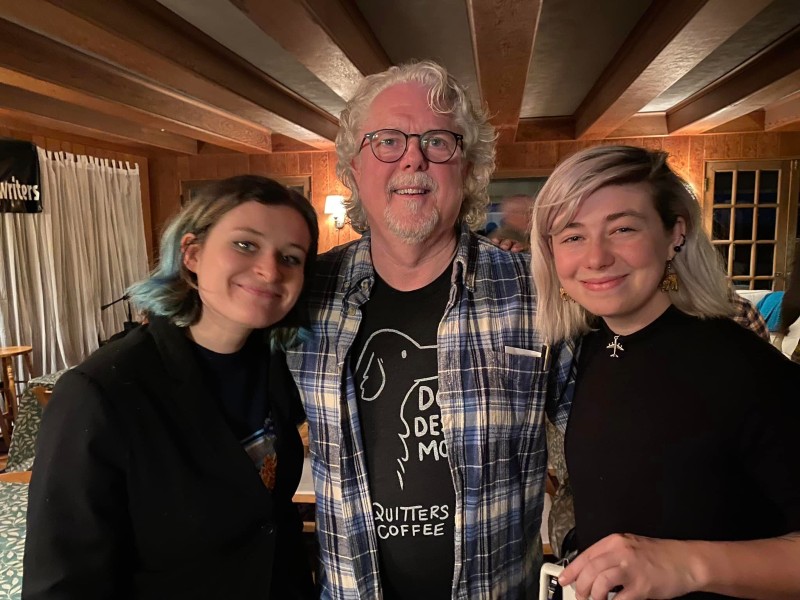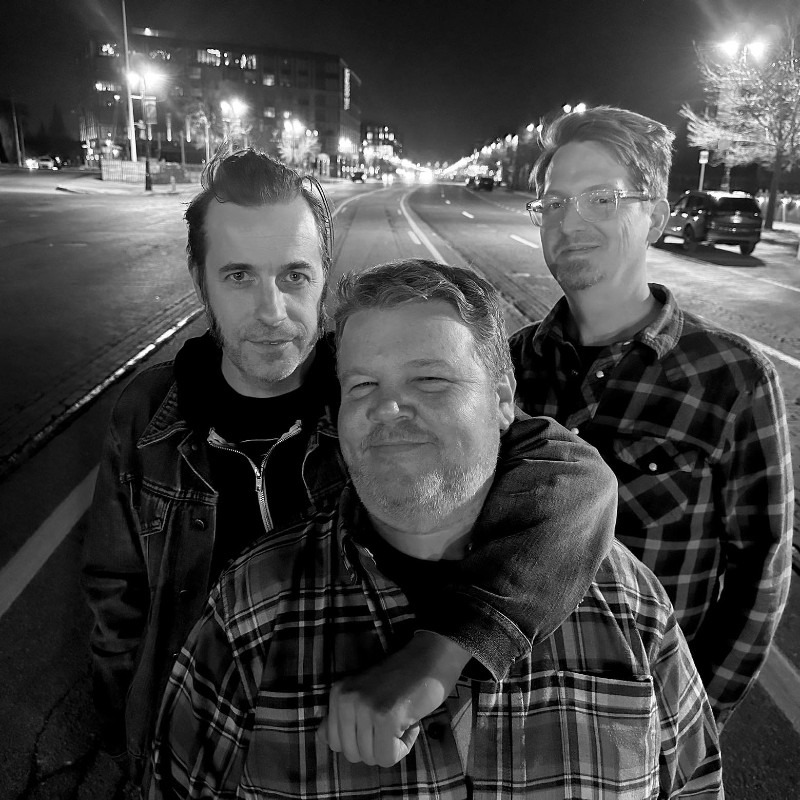Detroit’s Mike Ward Brings His Inspirational Folk Songs to AADL April 28

The state of the world weighs heavily on Mike Ward’s mind.
That concern prompted the Detroit singer-songwriter to pen a new folk song called “Why Not,” which sends an encouraging message to help others.
“When I have played it, people get how the song starts out small, gets broader as it goes on, and ends at a point where it’s up to us on a personal level,” said Ward, who’s also a University of Michigan alumnus.
“One of the things I have to work hard at is trying not to be too preachy, especially when I’m writing about things on a political level. It’s one of the areas where I try to find a balance.”
Backed by hopeful acoustic guitar and cello, he sings, “Why not do some good today with the time that we’ve got / Start with something simple / A lesson learned or to be taught / Plant a seed or lend a hand / A little helps a lot.”
“I’ve also been looking at not only how that affects the world in general, but also how it’s affecting people’s relationships,” Ward said. “It goes as broad as the country, but as narrow as some relationships and the struggles that people are having.”
“Why Not” is one of several songs Ward will be performing with Sara Gibson (cello) and Annie Bacon (vocals) at an April 28 show at the Downtown branch of the Ann Arbor District Library.
Ahead of the show, I spoke with Ward about his current state, his career transition from advertising to music, past albums, his latest songwriting efforts, his setlist for the AADL show, and plans for new material.
Double Vision: DuPont Phillips Combines Catalogs and Influences to Release New “Big Sky Sessions” EP

Ypsilanti’s Chris DuPont and Kylee Phillips decided a joint EP was long overdue.
After several years of performing and recording together, the singer-songwriters pooled their talents, catalogs, and influences to form DuPont Phillips and release Big Sky Sessions.
“This Big Sky Sessions EP was a very natural project. We used stuff that we have, and we used songs from our catalogs that have been out,” DuPont said.
“What feels good to me is that all of these interpretations of our songs that exist live now have a home. This project proved to me that putting out something doesn’t have to make you suffer. … We cut it in two days.”
During those two days at Ann Arbor’s Big Sky Recording, DuPont Phillips reimagined three tracks from prior solo releases and recorded two renditions of Sheryl Crow and Jason Isbell classics along with a new song.
“Sometimes it can be hard to explain to people what we’re doing because we’re playing things from our individual catalogs, but we’re supporting one another,” Phillips said. “For me, it’s fun to have something we can show people and say, ‘This is what it is. It’s this cross-pollination of what we both do.’”
Those collaborative efforts have resulted in an intimate folk-pop EP filled with stripped-down instrumentation, emotive duets, and lush harmonies. The six tracks featured on Big Sky Sessions offer vulnerable tales of love, growth, and change.
I recently spoke to the duo about revisiting and reworking older tracks, doing covers, recording a new song, spending time in the studio, preparing for an EP release show, and planning for the future.
Wintry Enchantment: Michael Skib Chronicles a Spiritual Quest for Truth on “This Bewitching Season” Album

For Michael Skib, winter brings a sense of enchantment.
The Ann Arbor singer-songwriter, multi-instrumentalist, and producer feels most creative during the darkest and quietest time of the year.
“It’s the best time for reflection, introspection, and creation because I’m not going to be out and about,” said Skib, who’s also half of the electronic-experimental duo Mirror Monster.
“I do find myself wanting to try and capture the melancholy that I feel because snow and darkness are beautiful. Those are the reasons why I’m drawn toward this type of music.”
That beautiful melancholy is woven throughout Skib’s latest album, This Bewitching Season, which features the hypnotic sounds of progressive rock, heavy metal, and shoegaze.
“I’m a seasonal person in the sense that there are different types of music that I listen to in different types of seasons,” he said. “I’m very sensitive to the way my environment impacts [my writing].”
Alongside those seasonal influences, Skib chronicles a spiritual quest for truth, peace, redemption, and salvation across the album’s nine tracks. His candid lyrics, ethereal vocals, and fearless instrumentation entice listeners to vicariously accompany him on his journey.
John Sinclair, Renowned Detroit Counterculture Poet, Writer, and Activist, Dies at 82

Poet, writer, and activist John Sinclair has died at age 82.
According to the Metro Times, he died of heart failure this morning at Detroit Receiving Hospital and had been struggling with health problems in recent months.
Born in Flint in 1941, Sinclair was a highly regarded leader in Detroit’s counterculture scene of the 1960s and 1970s. Famous for his radical politics, Sinclair also managed the MC5 and co-founded the White Panther Party and the Ann Arbor Sun.
In 1969, he was sentenced to 10 years in prison after offering two joints to an undercover female narcotics officer.
Various public and private protests soon culminated in response to Sinclair’s sentencing, including John Lennon writing a song called “John Sinclair” and the launch of an annual marijuana legalization rally in Ann Arbor that would later become known as Hash Bash.
Little Victories: Jim Cherewick Finds Cathartic Moments in Everyday Life on "Good News" Album

Jim Cherewick admits he recently went through a breakup.
But it’s not the kind of breakup that immediately comes to mind.
“A lot of it is about leaving that terrible retail [job],” said Cherewick, who previously worked at a big-box store. “It was such a burden—it was sad and it was scary. Getting out of that was so important and needed.”
Cherewick addresses that professional split on “Frosting on Fire,” the melancholic opener from the Ypsilanti singer-songwriter/visual artist’s latest indie-country-folk album Good News.
Backed by somber acoustic guitar and keys, he sings, “Questions stick to my bones / Like how much longer do we get another try here? / Making every single day a treasure cause I’m awake / And I won’t complain, no I won’t complain / I work at one of those stores.”
“As much as I didn’t want to write about it, I did because I wrote it during [the pandemic],” Cherewick said. “The job sucked, and it was soul-crushing. It was so bad, and then they would cut hours, and then they’d be hiring new people.”
Despite that soul-crushing experience, Cherewick finds fleeting moments of catharsis and gratitude on Good News. The album’s eight tracks reflect on the harsh realities of everyday life and yearn for an escape from drudgery, disappointment, and uncertainty.
Breakneck Speed: Mark Jewett Follows Life's Hectic Pace on "Too Fast" Single Featuring The Accidentals

These days, Mark Jewett moves at warp speed.
The Plymouth singer-songwriter maintains a frantic daily pace on his latest single, “Too Fast.”
“It was more of a general feeling of being closed in and trapped and things just coming at me faster than I could deal with them,” said Jewett about the folk-pop track, which features a collaboration with Sav Madigan and Katie Larson of The Accidentals.
“One day, I just took a break at my desk, and I picked up my guitar. I started doing this chunking rhythm like you hear at the beginning of the song. I was drinking coffee, and I thought, ‘I need some energy,’ and the line just popped into my head.”
That initial opening lyric was “I’ve got a thousand watts of black coffee / Pumpin’ through my veins,” but Jewett upped the ante to “Two thousand watts of black coffee” instead.
“Kyle Rasche caught me between shows up at Nor-East’r last year when I was in the merch barn. He said, ‘Man, that’s a great line,’ and he thought I had said something about ‘8,000 watts,’ but it was originally, ‘I’ve got a thousand watts,’” said Jewett, a University of Michigan alumnus, who started writing the track last spring. “I thought maybe there was too much there, so starting it with 2,000 [watts] just punctuates it right at the beginning.”
Sonic Journey: Gastón Reggio Ventures From "Michigan" to North Carolina on New Jazz-Fusion Album

For Gastón Reggio, Michigan represents the ideal name for his second full-length album.
The Uruguayan jazz composer and multi-instrumentalist penned most of the album’s tracks while living in Ann Arbor and wanted to capture those experiences from 2019 to 2021.
“Each song has and [strives] to tell a story about things that happened during that time. Particularly, I was looking for an [album] name that worked well in English and Spanish,” said Reggio, who previously drummed with Chirp and is now based in Durham, North Carolina.
“My producer Rodrigo [Cotelo] … mentioned naming the album after the song ‘Michigan’ because it summarized my [time] here and served as the basis for some of the stories that are [sonically] told through my songs.”
On Michigan, Reggio chronicles an inspirational sonic journey filled with jazz, prog rock, and world music influences. The album starts in the Great Lakes state and whisks listeners across the Appalachians to find new musical adventures in North Carolina.
“I just let the ideas for the songs come without any restrictions, and I like to combine all of my influences to create a [personal] way to express myself through music,” he said. “I hope listeners realize the depth and honesty of this music; it’s a part of me, and if you listen to it, you will get to know me a little bit more.”
To learn more about Reggio, I recently spoke with him about growing up in Uruguay, studying music and jazz drums in Brazil, coming to Ann Arbor and joining Chirp, relocating to North Carolina, working on Michigan, and preparing for several upcoming live shows.
Everyday Monsters: Fangs and Twang Shares the Horrors and Delights of Michigan and Out-of-State Creatures on Latest Album

After years of writing about monsters, Fangs and Twang didn’t expect to find them in human form.
The country-rock trio of Billy LaLonde (drums, vocals), Andy Benes (guitar, vocals), and Joe Bertoletti (bass, vocals) discovered some people started spreading monstrous misinformation at the height of the pandemic.
In response, Benes channeled that disbelief and frustration into the Ypsilanti band’s opening track, “You Monster,” from its fourth album of the same name.
Alongside explosive electric guitar, organ, and fiddle, he sings, “It’s hard to be you and me / When we can’t tell what’s true / It seems to me that we can’t agree / Even that the sky is blue.”
“That song came to me … and it was done in 20 minutes,” Benes said. “All of the lyrics and all of the music just came out, and that was what was on my mind. [It’s about] not having a common set of facts or a common language that we’re speaking anymore as people and how horrible that is.”
The title track also lays the groundwork thematically for the horrors and delights Fangs and Twang uncovers on You Monster.
The Voice Within: Mike Green Follows His Instincts on “Listening for the Bell” Album

Mike Green listened to his inner voice but wasn’t sure where it would take him.
The folk singer-songwriter, guitarist, and booking agent ruminated for years about how to share his life experiences.
“I always thought as a younger adult that I wanted to write a book of my personal philosophy, but I never had anything to say,” said Green, who resides in Ann Arbor. “Then when I started writing these songs [during the pandemic] … and all these things I’ve always thought about, they just sort of came out in poetic ways.”
What resulted were 12 insightful tales for his debut album, Listening for the Bell, which explores the ups and downs of following your instincts.
“There’s a bunch of those songs that were written that way, and I just trusted it,” said Green, who started as a touring musician in 1978. “And then what I realized early on—after studying all of this—is that I had been in songwriting school for nearly 40 years.”
That schooling came from representing artists like Utah Phillips, Carrie Newcomer, Jesse Winchester, and John McCutcheon as a booking agent and listening to singer-songwriters like Greg Brown, Kenny White, Chris Smither, and Stephen Fearing.
“Chris Smither, probably more than anybody, is the gold standard to me on how you marry lyrics and words and have them come out … to be that way,” said Green, who started as a booking agent in 1986 and opened his own agency in 2004. “There’s no other way you can say it, and if you don’t say it just the right way, it doesn’t fit.”
The Archivist's Tale: Evan Haywood Digs Through His Past to Help Define His Musical Future On New Live Album

Evan Haywood remembers his first live solo show at Canterbury House in 2014.
The producer, musician, songwriter, rapper, visual artist, filmmaker, and digital archivist recalled feeling nervous about sharing vulnerable folk songs and playing a nylon-string guitar at the Ann Arbor venue.
“It was such a jarring experience almost to go from performing in sweaty clubs and bars where everybody’s dancing … and having a good time to this very stark, acoustic performance where I’m baring my soul,” said Haywood, a University of Michigan alumnus who had previously performed live with the local hip-hop group Tree City.
“I feel like that performance was some sort of watershed moment for me because I had to prove to myself that I could do it. I had never done a performance like that with just an acoustic guitar and myself.”
Fortunately, Haywood’s intimate performance was recorded on cassette by Fred Thomas and initially released on limited-edition tape through Thomas’ Life Like label in 2015. Today, part of that performance now appears on Haywood’s latest live album, Canterbury Tales.
“I spent the past 10 years or so honing them and working on the mixes and cleaning up some of the noise and things like that to get them to the point they’re at now,” Haywood said.
“When you’re dealing with tape, you have fewer options, so you really have to work in a detailed way to be able to massage those recordings and get the good stuff out and take some of the noise down. That’s something I’ve been tinkering with—those Canterbury House recordings—and I feel like now my tinkering is done.”


































